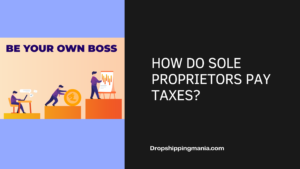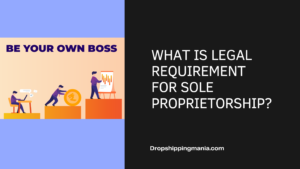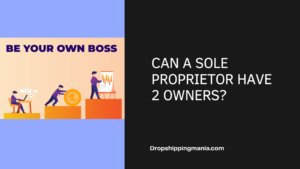Sole Proprietorship

Starting a business is a daunting task, and there are many legal structures and options to choose from. One of the most popular options for business owners is sole proprietorship. A sole proprietorship is a unique business structure that allows the individual owner to have complete control over their business and its assets. In this blog post, we’ll explore the unique benefits of a sole proprietorship as well as some of the potential drawbacks you should be aware of before making your decision. We’ll look at state regulations, tax implications, personal liability, and more so you can make an informed decision about what type of structure best suits your business goals.
What is in a sole proprietorship?

A sole proprietorship is a business that is owned and operated by one person. The sole proprietor is responsible for all aspects of the business, including its finances, employees, and customers. A sole proprietorship is the simplest and most common type of business structure. It is easy to set up and requires little paperwork. Sole proprietorships are not subject to the same regulations as corporations, which makes them less expensive to operate. However, sole proprietorships are also less secure than corporations, as the owner is personally liable for all debts and losses incurred by the business.
What is an example of a sole proprietor?

A sole proprietor is someone who owns an unincorporated business by themselves. The sole proprietor is the only one who is legally responsible for the debts and obligations of the business. They also have complete control over all aspects of the business, including decision-making, profits, and losses.
What are the pros and cons of sole proprietorship?
There are a few pros and cons to consider when it comes to sole proprietorship. On the plus side, sole proprietorships are relatively easy and inexpensive to set up. Additionally, the owner has complete control over the business and all decision-making. However, there are a few downsides to bear in mind as well. For instance, the owner is personally liable for all debts and liabilities incurred by the business. This means that their personal assets could be at risk if the business fails. Additionally, raising capital can be difficult as potential investors may be hesitant to invest in a business with only one person at the helm.
What are 5 characteristics of a sole proprietorship?
There are several key characteristics that distinguish a sole proprietorship from other business structures. These include:
1. The owner is the only decision-maker. In a sole proprietorship, the business owner has full control over all aspects of the business. They alone make all decisions regarding the direction, operations, and finances of the company.
2. The owner bears all the risk: As the sole decision-maker, the owner of a sole proprietorship also bears all the risk for their business. If the business fails, they alone are responsible for any debts or losses incurred.
3. The owner receives all the profits: Conversely, as the only decision-maker, the owner of a sole proprietorship also receives all of the business’s profits. This can be a significant advantage, as it allows for complete autonomy and potential for high earnings.
4. Simple to set up and maintain: Sole proprietorships are relatively simple and straightforward to establish and maintain compared to other business structures. There is generally less paperwork and fewer compliance requirements involved in setting up and running a sole proprietorship.
5. Flexible: Sole proprietorships offer greater flexibility than other types of businesses when it comes to things like hours worked, methods used, etc. This can be beneficial for those who want more control over their work/life balance or who prefer to work independently.
What is the owner of a sole proprietorship called?
A sole proprietor is an individual who owns an unincorporated business by himself or herself. A sole proprietor may use a trade name or business name other than his or her legal name. He or she is personally liable for all debts incurred by the business.
How do sole proprietors pay taxes?

There are a few different ways that sole proprietors can pay their taxes. They can choose to pay quarterly estimated taxes, or they can wait until the end of the year and pay all of their taxes at once. If they have employees, they will also need to withhold taxes from their paycheck and send them in to the IRS.
Why is it good to be a sole proprietor?
There are a number of reasons why it can be advantageous to be a sole proprietor. For one, as the sole owner of your business, you have complete control over all aspects of the business, from its day-to-day operations to its long-term strategic direction. Additionally, as a sole proprietor, you get to keep all of the profits that your business generates; in contrast, if you were to set up your business as a corporation, you would have to share those profits with shareholders. Finally, sole proprietorships tend to be much easier to establish and dissolve than other business entities such as corporations.
What is legal requirement for sole proprietorship?

There are a few legal requirements that you must meet in order to establish a sole proprietorship. First, you must file the appropriate paperwork with your state or local government. This will usually include registering your business name and obtaining a business license. You will also need to obtain any permits or licenses required by your city or county.
Once you have taken care of the legalities, you will need to open a business bank account and obtain insurance for your business. While not required, it is generally advisable to separate your personal finances from your business finances for tax and liability purposes. Finally, you should develop a good understanding of the relevant laws and regulations governing businesses in your area.
What is the difference between a sole trader and a sole proprietor?
A sole proprietor is an individual who owns and operates a business by himself. A sole trader is a type of sole proprietor who is in business for himself. The main difference between a sole proprietor and a sole trader is that a sole proprietor can have employees, while a sole trader cannot.
What is my job title if I own my own business?
If you own your own business, your job title is likely “owner” or “proprietor.” However, the specific title depends on the type of business you have. For example, if you have a sole proprietorship. You are the sole proprietor and your job title would be “sole proprietor.” If you have a partnership, you would be a partner and your job title would be “partner.” If you have a limited liability company (LLC), your job title would be “member” or “managing member.”
Do I need a separate bank account for my sole proprietorship?

A sole proprietorship is a business that is owned and operated by one individual. This type of business is the simplest and most common form of business ownership. Because the owner and the business are one and the same, there is no need to have a separate bank account for the business. All of the owner’s personal assets are available to be used in the business, and all of the profits from the business go directly to the owner.
While there is no legal requirement to have a separate bank account for a sole proprietorship. It is generally recommended for practical reasons. Keeping track of expenses and income can be simpler if they are kept in separate accounts. This also makes it easier to prepare financial statements and file taxes. Additionally, having a separate account can help build credibility with vendors and customers.
How much tax will I pay as a sole proprietor?
As a sole proprietor, you will be responsible for paying taxes on your business income. The amount of tax you will pay will depend on your tax bracket and the amount of income your business generates.
If your business is generating a lot of income. You may be pushed into a higher tax bracket and end up paying more in taxes. However, if your business is not generating much income, you may be able to take advantage of certain tax deductions to lower your overall tax liability.
Speak with an accountant or tax professional to get a better idea of how much tax you will owe as a sole proprietor. They can help you calculate your estimated taxes and file the necessary paperwork with the IRS.
What is the easiest form of business ownership?
A sole proprietorship is the simplest form of business ownership. You are the sole owner and responsible for all aspects of the business, from taxes to liability. The biggest advantage of a sole proprietorship is that it is easy to set up and you have complete control over the business. There are no complicated partnership agreements or corporate bylaws to worry about. However, the downside is that you are personally liable for all debts and losses incurred by the business.
Can a sole proprietor have 2 owners?

Yes, a sole proprietor can have 2 owners. The business would be owned by the individual and his or her partner. Each owner would be liable for their own actions and the debts of the business.
For more informative articles visit given links:


